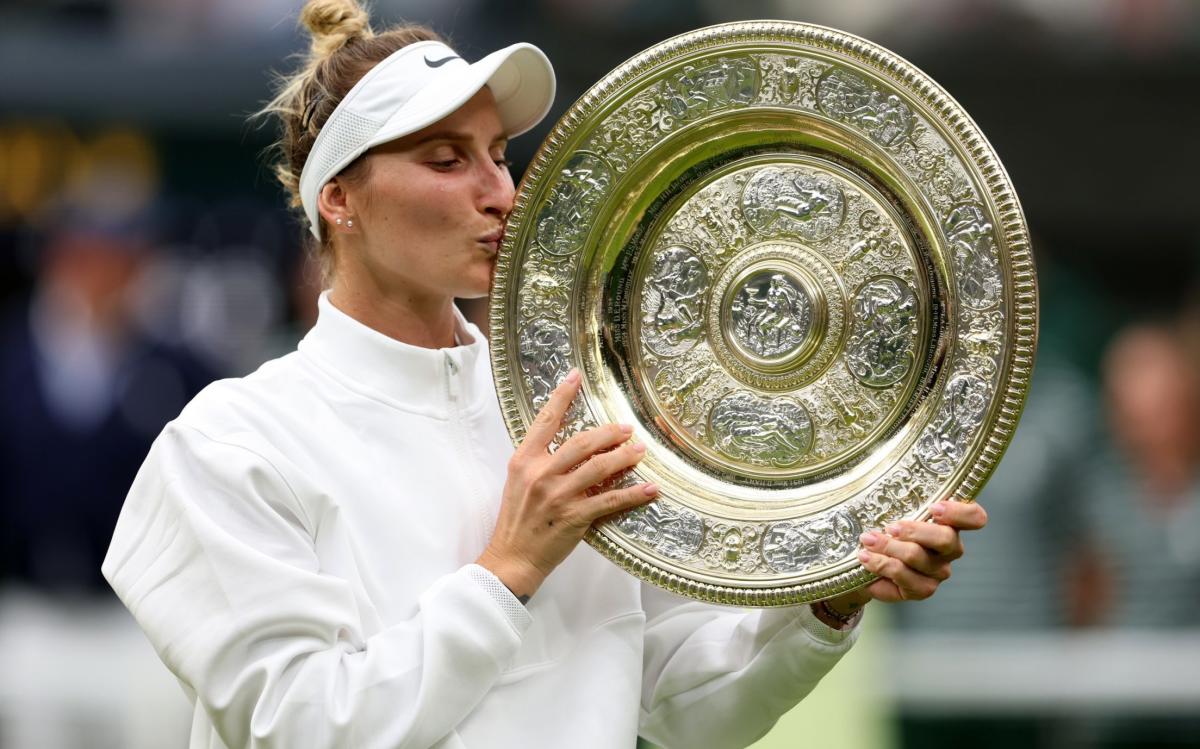Sports
The full rundown on who could win Wimbledon

With the 2024 Wimbledon Championships springing to life from July 1, it will all begin with a flurry of wildcards, every court being used and a whole heap of questions. Like: who really has a chance to go all the way – and what is their game really like?
So while you wait in the queue, we have the ultimate cheat sheet for you, breaking down the top contenders and giving you a scouting report on their strengths and weaknesses so you can pass off knowledge of their game as your own…
Strengths: The purest ball-strike on the tour. If you’re lucky enough to be watching him in person, listen to the boom when he hits his groundstrokes. It’s like a rocket going off. Relentless and highly competitive.
Weaknesses: Umm… anyone? Like a younger Novak Djokovic, Sinner has no obvious holes in his game.
Personality: Sinner is the least Italian Italian you will ever meet. Born in South Tyrol, where they speak German, he is fair-skinned and has the logical, literal-minded mindset we associate with that language.
Prospects: As good as anyone’s, with the possible exception of Carlos Alcaraz.
Strengths: Arguably the most varied kitbag the game has ever seen. His drop shot is his calling card, but he can also dominate from the baseline. That combination of power and touch – and his matchless ability to improvise on the hoof – makes him a crowd favourite wherever he goes.
Weaknesses: Lacks Sinner’s single-minded focus. Can go on mental walkabouts during matches, or over-complicate what should be quick kills.
Personality: Most top players keep a poker face during matches but Alcaraz is a rare example of someone who smiles, especially after producing one of his many highlight-reel hot-shots. Equally sunny off the court.
Prospects: Defending champion at Wimbledon and the newly crowned French Open champion to boot, Alcaraz will start as the clear favourite.
Strengths: Where does one start? Surely the best returner tennis has ever seen. Also owns the most robust double-handed backhand in history. The serve and forehand aren’t bad either.
Weaknesses: Normally, none. But Djokovic underwent surgery to repair a torn meniscus three weeks ago. Even in the best-case scenario, he will be going into the tournament undercooked.
Personality: A complex and fascinating character who speaks half a dozen languages fluently and has a very distinct worldview. Some of this involves pseudo-scientific mumbo-jumbo like the “human upgrade device” he likes to wear on his chest.
Prospects: It’s far from certain that Djokovic will play at all, given his ongoing recuperation from that knee operation. If he does, a deep run would seem improbable. But then, Djokovic claims to have won the Australian Open on more than one occasion while carrying significant muscle tears.
Strengths: The most lickety-split mover on the tour, De Minaur’s turn of pace leaves everyone but Carlos Alcaraz in the dust. Also hits his groundstrokes with relatively little top spin – an asset on grass, where flat shots skid on more quickly. Has beefed up his serve considerably over the past year or so.
Weaknesses: Compared to his main rivals, he lacks point-ending power. Also has a poor record at major events: just two quarter-final appearances to show from 27 attempts.
Personality: The sort of clean-cut, polite and modest young man whom any girl would be happy to introduce to her parents. In this case, the girl in question is British No1 Katie Boulter.
Prospects: Very much a dark horse, given his modest record at the majors, but is building momentum and won the recent Libema Open in the Netherlands.
Strengths: A venomous, swinging lefty serve that puts one in mind of 2001 Wimbledon champion Goran Ivanisevic. Moves well for a big man and has brought a more aggressive edge to his shotmaking in recent weeks.
Weaknesses: At 22, Draper is still very green at the top level and has a modest record at the majors. Yet to show the sort of physical resilience required by a deep run into the second week of a slam.
Personality: Likeable, well-spoken and intelligent, Draper is an engaging interviewee and could easily become a sporting celebrity if his results start to match his huge potential.
Prospects: Has had perhaps the ideal build-up. Having claimed a maiden ATP title on the grass of Stuttgart, Draper beat defending champion Alcaraz at Queen’s, and then avoided exhaustion by bowing out at the quarter-final stage. Seeded for the first time at a major, his prospects may depend on which high-ranked player he is drawn to face in the third round.
Strengths: Plays old-fashioned route-one stuff with the biggest serve-forehand combo in the business. On grass, his backhand slice becomes an awkward proposition.
Weaknesses: Has one of the most vulnerable double-handed backhands around, so struggles to cope when penned into that corner.
Personality: A model for Hugo Boss, Berrettini must be one of the best-looking athletes alive. Genial character who is most at home while sharing a plate of pasta with his stereotypically Italian family (as depicted in Netflix’s Break Point documentary).
Prospects: Now ranked No 60 after a series of injuries, Berrettini is unseeded, but no one will want to face this crowd favourite. Reached the 2021 Wimbledon final, where he took a set off Djokovic.
WOMEN
Strengths: The runaway world No1 is a fierce competitor who hits with mighty top spin off both wings and has accelerated her serve this year. Swiatek comes in on a 19-match winning streak after going unbeaten on outdoor clay.
Weaknesses: Has never been past the quarter-finals of Wimbledon, despite winning the juniors in 2018, and has played only 19 tour-level matches on grass. Uses an extreme grip on the forehand side, which can be exposed by the sort of low, fast, skidding balls that you tend to face on this surface.
Personality: An introvert who prefers her own company and is happiest when curling up with a good book. Nevertheless, Swiatek can give punchy opinions and has been a high-profile supporter of Ukrainian players among other good causes.
Prospects: Hard to call, but the change in the first serve could be influential. Having averaged 102mph during last year’s clay-court season, Swiatek lifted that figure to 110mph at the recent French Open. “I feel like every year it’s easier for me to adapt to grass,” she said, after thumping Jasmine Paolini in a one-sided Roland Garros final.
Strengths: Was only 15 when she famously defeated Venus Williams on her main-draw debut at Wimbledon, and retains all the assets she had then: extraordinary athleticism, a powerful serve and a backhand that never lets her down.
Weaknesses: Gauff’s forehand has a habit of misfiring, and occasionally collapses completely. Like Swiatek, she uses an extreme grip, but her swing is longer and has more elements that can go wrong.
Personality: Possesses more star quality than any of her rivals. Gauff is just 20 but has tackled some big subjects – from racism to climate change – with extraordinary poise and maturity.
Prospects: Grass wouldn’t be Gauff’s preferred surface, but at least it gives her a better chance of sneaking past Swiatek – the nemesis who has beaten her 11 times in 12 meetings. A long shot but not an impossible one.
Strengths: Amazonian figure who hammers every ball as if it has personally insulted her. Big serve, big forehand, big backhand, big everything.
Weaknesses: Can be a little heavy-handed, and once her radar goes wonky, she struggles to get it back. In each of the past two seasons, Sabalenka reached the Wimbledon semi-finals and won the first set, yet proved unable to close.
Personality: As extroverted as Swiatek is introverted, Sabalenka has a ready laugh and a loud voice that matches her uninhibited strokeplay.
Prospects: Decent, even though she retired from a match in Berlin last week citing a neck/shoulder problem. Was photographed hitting at Wimbledon without strapping on Tuesday.
Strengths: The 2022 champion has probably the best serve on tour and hits a flat ball with apparently effortless timing. All of these characteristics make her superbly suited to grass-court tennis, and have contributed to a 4-2, head-to-head record against Swiatek.
Weaknesses: Rybakina’s late spring and summer have been decimated by outbreaks of ill-health. She doesn’t like talking about the issue and was downright rude when it was raised in her press conference on the eve of the French Open.
Personality: Distant and reserved, Rybakina didn’t even celebrate when she won Wimbledon two years ago.
Prospects: Would stand among the favourites but for the mysterious and recurring health issues that have bedevilled her season.
Strengths: A charmingly well-rounded game includes lovely touch on the drop shot as well as a wide range of other dinks and slices. Also bangs down a surprisingly effective serve for a woman who stands just 5ft 6in.
Weaknesses: Mentally suspect. Has reached the final of Wimbledon in each of the last two seasons, but laid an egg – to borrow one of John McEnroe’s phrases – against Marketa Vondrousova in last year’s showpiece.
Personality: Used to be known as “the minister for happiness” on account of her ever-present smile, although the joy went missing earlier this year when she was battling a sore knee. Also a leading voice on the Professional Tennis Players’ Association – Novak Djokovic’s attempt at an independent player union – and refreshingly unafraid to call out the game’s inequities.
Prospects: Does Jabeur want it too much? She has said that she would love to win Wimbledon and then start a family, and that strength of that desire has perhaps worked against her in the biggest matches. Still, her 17 Wimbledon wins put her ahead of every other player on our list.
Strengths: The defending champion is a natural disruptor: a lefty with great touch and a discombobulating way of coming up with shots you don’t expect.
Weaknesses: Vondrousova’s unpredictability extends to her own performance level. Can lack focus or direction when the feeling isn’t with her.
Personality: As awkward in front of a microphone as she is to play, Vondrousova would rather be at home with her cat.
Prospects: A nasty fall in Berlin last week forced Vondrousova to retire hurt. We don’t yet know how serious the injury is, but the chances of a successful title defence have shifted from improbable to remote.






